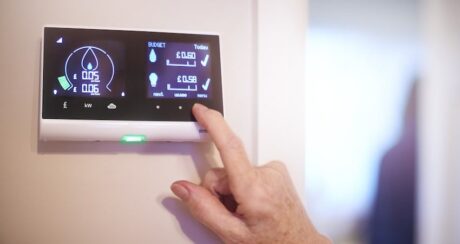With energy prices soaring, now’s the time to make those changes that could help to cut your gas and electricity bills. While you can’t do anything to lower the cost of energy, you can reduce the amount you use in your home to save money and help the environment at the same time!
We’ve all heard about putting on an extra jumper instead of turning on the heating, but there are lots of other ways you could save energy at home. Some will make more of a difference than others, but together these actions could help you to save money on your energy bills and reduce the impact of rising energy prices.
Tariffs and suppliers
1. Move to a fixed-rate energy tariff. Fixed tariffs tend to be cheaper than a supplier’s default variable tariff and prepayment tariff, and they also come with the guarantee that you won’t face any price rises for the duration of the contract. However, bear in mind that fixed rate tariffs may not always be cheaper, especially when the energy market is volatile, so always compare options to find the most suitable tariff for you.
2. Compare suppliers. If you’ve been with the same supplier for several years, you may not be getting the best price. Take some time to research and compare deals to see if you can switch to a cheaper option.
3. Pay by direct debit. Monthly direct debit is typically the cheapest way to pay for your energy, compared to cash, cheques, or prepayment.
4. See if you’re in credit with your energy supplier. If you pay for your energy monthly, there’s a chance you’ve been paying for more than you’ve used. You may have built up a large amount of credit that you could ask the supplier to refund. You could also use it to reduce your monthly payments.
5. Get a smart meter. Smart meters are being rolled out across the country, and they can help you see exactly how much energy you use and what items use the most energy. By making you more aware of your energy usage, they can help you identify areas where you can cut down your energy usage. Suppliers should be able to install smart meters at no upfront cost to you.
Appliances
6. Turn off electrical items. You’ve heard it before, but one of the easiest ways to save energy is to turn off any items you aren’t using. This means completely turning off and unplugging items, as even if they’re on stand-by or plugged into a socket, they could still be using some energy. The Energy Saving Trust estimates you could save £35 a year by switching off unused appliances.
7. Don’t charge your phone overnight. It may be convenient, but most phones only take a few hours to fully charge. That means your fully-charged phone could be left plugged in for hours unnecessarily, wasting electricity and money.
8.Wash full loads in washing machines and dishwashers. Whether you wash one sock, one plate or a full load, the same amount of energy is needed to power these machines. Try to limit the number of times you use these appliances by making sure you load them up as much as they allow. Also, only washing full loads is likely to reduce the number of times you need to use them. By using both appliances one less time per week, you could save around £16 per year, according to the Energy Saving Trust.
9. Wash on lower temperatures. Washing clothes at higher temperatures uses more energy, and it isn’t always necessary. In many cases, washing at a lower temperature will do the job and use less energy. Energy Saving Trust says washing at 30 degrees could save a household £8 a year.
10. Air dry clothes instead of tumble drying. The UK may not be blessed with the best weather, but on the few days it’s sunny and not raining, you should try to dry your clothes outside as this won’t cost you a penny! You could also dry them indoors, but be aware of any condensation issues this might cause.
11. Clean your washing machine and dishwasher filters. When you use these appliances, dirt gathers in their filters which will make them work less efficiently. By cleaning these regularly, you can help them to perform at their best.
12. Take shorter showers. A long shower can be relaxing after a hard day, but they also use a lot of energy. Try to cut down the time you spend in there so you don’t waste any electricity or water.
Kitchen
13. Boil the kettle once for the water you need. How many times have you boiled a kettle twice because you didn’t use it after the first boil? Probably too many to count! This uses unnecessary energy, so make sure you only boil it once. Similarly, if you’re making one cup of tea, you only need to boil enough water for one cup. Boiling more water than you need will waste energy.
14. Keep your fridge around 3/4 full. Filling your fridge can help to keep it cool, but if it’s too full, it needs to use more electricity to maintain the temperature and circulate the cold air.
15. Clean the coils of your fridge. Your fridge is permanently on, so if it’s not working efficiently it could be wasting a lot of electricity. By cleaning the coils at the back of the fridge and getting rid of any dust, you make it easier for the fridge to keep your food cool.
16. Defrost your freezer. If ice builds up in your freezer, it needs to work harder and will use more electricity to keep your food frozen. Defrosting your freezer regularly helps it to work more effectively as it needs to use less energy to maintain the right temperature.
17. Use the slow cooker. Even though slow cookers are switched on for a long period of time, they don’t use much electricity and can be more energy efficient than a standard oven. They typically only use the same amount of energy as a lightbulb.
18. Consider using a pressure cooker. These can be more energy efficient than using an oven as they cook your food faster.
19. Use the microwave. If you need to heat up some food, using the microwave instead of the hob is likely to use less energy.
20. Use the right size pan and hob. Using a larger pan and hob than you need wastes energy, as you need more gas or electricity to heat a larger surface area.
21. Put lids on your pans while cooking. This keeps the heat in and helps to cook your food faster.
22. Plan your cooking. If you plan what you’re going to cook in advance, you can take advantage of when the oven and hobs are on. Instead of switching on the oven twice and waiting for it to heat up, you might be able to cook multiple items at the same time and cut down on the time it’s turned on.
Heating
23. Layer up with an extra jumper. Not a new piece of advice but it’s still worth saying! If you’re feeling a little chilly in your house, putting on a jumper or some thicker socks could solve the problem without needing to put on the heating. Always ask yourself if you really need to put the heating on, or if you can manage without.
24. Draught-proof windows and doors. If you do switch on the heating, the last thing you want is for that heat to escape. You can get a professional to draught-proof your house, but you can also do it yourself by making or buying draught excluders for the bottom of your doors and putting tape or special draught-proofing strips around your windows.
25. Only heat the rooms you’re using. You can turn individual radiators on and off, so if you’re not going to be in your bedroom until the evening, for example, you don’t need to heat that room during the day. If you’ll mainly be in the living room, you only need to turn on that radiator.
26. Bleed your radiators regularly. This will help them to work more effectively, so it takes less energy for them to heat your home.
27. Keep your radiators clear. If you put items directly in front of a radiator, such as a sofa, this makes it more difficult for the heat to flow around the room. Also, cleaning any dust from your radiators helps them to heat your rooms more efficiently.
28. Use your curtains. When it’s sunny, open your curtains so the sun can warm up your rooms. When it starts to get darker and cooler outside, shut your curtains to keep the heat in.
29. Shut the doors. Keeping doors closed stops the heat escaping. Especially if there are rooms in your house that you don’t use or heat as much, such as a spare room or the dining room. You should close these doors to prevent draughts and keep the heat in the rooms you use.
30. Turn the thermostat down. Even if you turn your thermostat down by as little as one degree, the Energy Saving Trust estimates a three-bedroom semi-detached house could save £55 a year (based on energy prices in June 2021).
31. Only turn on the heating when you need it. If your central heating has a timer, make sure you set it to come on at the times you need. Even having your heating on for an extra hour each day can add up to a significant amount of energy and money wasted.
32. Use heating controls. Heating controls can help to heat your home more effectively by giving you more control over when and where your heating comes on. For example, smart heating controls allow you to adjust your heating remotely so you can change when the heating comes on if your places change. In many cases, you can change your heating controls without changing your boiler.
33. Insulate your hot water cylinder and your pipes. According to the Energy Saving Trust, insulating your hot water tank with an 80mm thick ‘jacket’ could save about £18 a year. Similarly, insulating your pipes can also help them to retain heat. You should be able to buy insulation for pipes and tanks from most DIY shops.
Lighting
34. Use natural light. Your home has windows that let in lots of light, so make the most of them! During the day you will often be able to manage by using the light from outside, so try not to switch on any main lights until it gets dark outside.
35. Switch off your lights. Many of us will already be in the habit of turning off lights when we leave a room and no longer need them, but it’s still worth highlighting this point. The Energy Saving Trust estimates this simple act could save you £11 a year.
36. Use LED light bulbs. When you do need to switch on the lights, make sure you have energy-efficient LED light bulbs as they use considerably less energy than halogen bulbs.
Longer-term energy saving investments
37. Double-glaze your windows. Double- or triple-glazed windows can help to minimise heat loss.
38. Get an energy-efficient external door. Most new external doors will have some form of insulation and draught-proofing, so if your door is old, it may be worth draught-proofing it or replacing it with a more modern and better insulated door.
39. Insulate your walls, roof and floor. Insulating your house is likely to involve a lot of work and cost a sizeable amount of money, but it could be worth it in the long run if they stop heat escaping from your house.
40. Upgrade your boiler. Modern boilers are more energy efficient than older models, so they should be better at heating your house. Combi boilers can be the most efficient type of boiler, but this will depend on your household and how much hot water you typically use.
41. Choose energy-efficient appliances. We have lots of appliances in our homes, so making sure we buy energy-efficient models can help reduce our overall energy usage. Appliances are labelled A to G, with A being the most energy-efficient. Also make sure you only buy the size of appliance you need; if you live on your own you probably don’t need the biggest fridge-freezer on the market.
42. Install solar panels. This may not be a viable option for many because of the initial expense of installing them. However, if you have your own solar panels, you can generate your own electricity and use it to power appliances in your home or earn some money by selling it to energy firms (if you’re with the right supplier).
If you’re finding it difficult to pay for your energy bills, you should contact your energy supplier to see if you are eligible for help. There are also government schemes such as the Warm Home Discount and the Winter Fuel Payment that you may qualify for.
» MORE: Schemes to help pay for your gas and electricity
Image source: Getty Images
Dive even deeper

Are Energy Prices Going Down? Should I Fix?
While the energy price cap rose at the beginning of January 2024, Ofgem has announced that it will fall again from April. Find out what this means for our gas and electricity bills.

How Does the Energy Price Cap Work?
The energy price cap is set by energy regulator Ofgem. It doesn’t cap bills but instead limits how much energy providers can charge consumers for the units of energy they use.

How to Get Help With Your Energy Bills
If you’re finding it difficult to pay your energy bills, you may be eligible for government grants or support from your energy supplier. Find out what schemes are available to help you pay for your gas and electricity.

